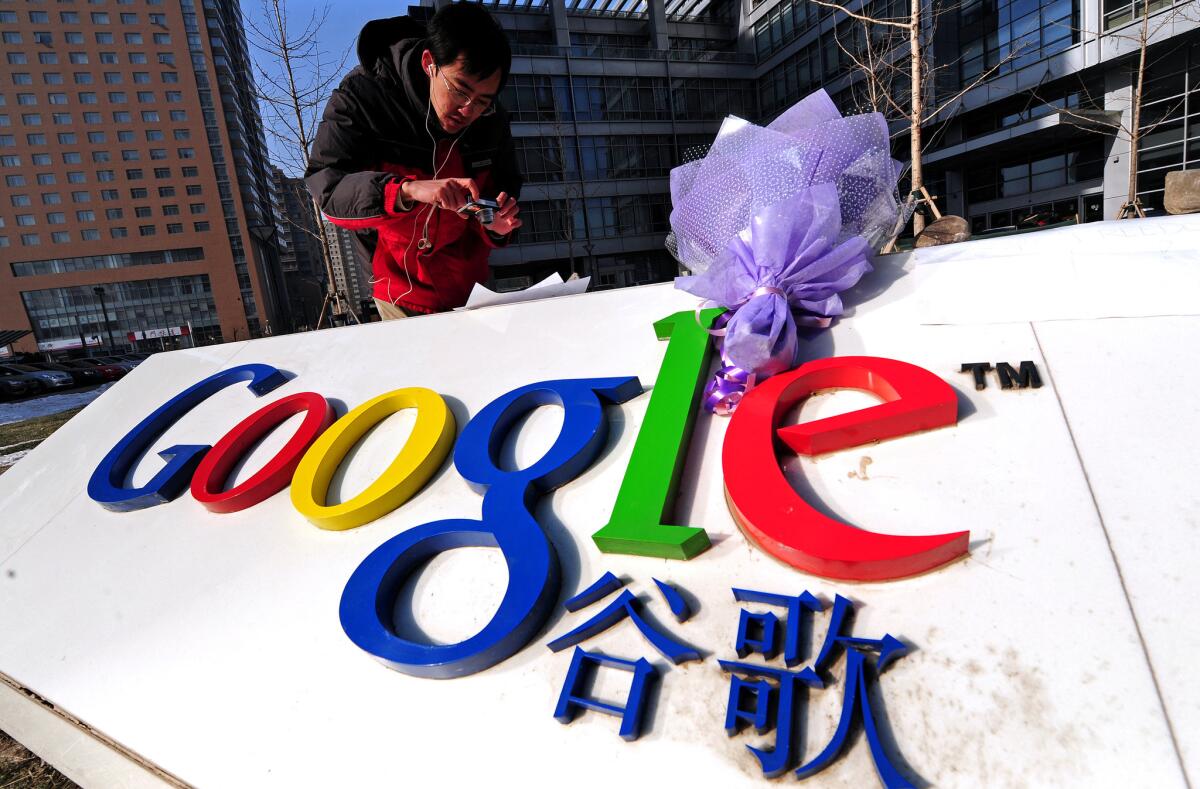Chinese censorship costing U.S. tech firms billions in revenue

A bouquet of flowers lay upon the company logo outside the Google China headquarters in Beijing on Jan. 14, 2010. Google stopped mainland search in China that year.
Reporting from Beijing — With Apple selling $13.2 billion worth of iPhones in China last quarter, and Alibaba raising nearly twice that on the New York Stock Exchange, it’s no wonder Chinese officials want to showcase technology as a bright spot of cooperation when President Xi Jinping travels to the United States this week.
Xi will visit the Microsoft campus near Seattle for a forum of tech titans from both countries, but the discussion almost certainly will paper over an uncomfortable fact: Chinese government censorship is costing U.S. tech companies billions of dollars in revenue — and the “Great Firewall” isn’t likely to come down soon.
Although the Great Firewall’s free-speech ramifications are often discussed, its financial impact has received scant analysis. The economic repercussions of this protectionism could be most severe in California, home to the biggest U.S. companies that have been cut off from China’s netizens. The censorship shuts out the state’s tech giants — Google, Facebook, Twitter — along with upstarts such as Snapchat, Dropbox, Ustream and Wordpress.
How much the Communist Party’s Great Firewall costs California companies is difficult to estimate, because the companies have not disclosed how much they believe they have lost. No industry trade association has put forth comprehensive figures.
But basic number-crunching puts the forfeited sums and missed opportunities at billions of dollars a year as the number of Internet users in China has exploded to 668 million.
“I don’t think in general there’s that much awareness, at least outside of Silicon Valley, about the impact of some of the restrictions, the Great Firewall, and what the financial consequences are and what that might translate into” for California, said Jock O’Connell, a Sacramento-based trade expert. “How many jobs would there be for people in California were those restrictions removed?”
American tech giants are under pressure from China to turn user data and intellectual property over to the government and to transfer technology to Chinese partners. Companies including San Diego chip maker Qualcomm have come in for massive antitrust fines in China. Dell, Intel and others recently struck technology-sharing and joint investment deals in China that some outside observers say could weaken them long term.
“They do it with a gun to their head. They say either you’re going to make these investments or you’re not going to get access to the market,” said Robert D. Atkinson, president of the Information Technology & Innovation Foundation.
The blockages represent the most in-your-face form of market denial for U.S. players, yet companies see few effective options. China, for its part, says it welcomes foreign tech companies — so long as they’re on board with China’s censorship regulations.
Google, Snapchat, Dropbox and other blocked California firms declined to discuss costs to their business. One executive, who asked not to be named to avoid antagonizing Chinese authorities, said, “I’m not sure we’ve added it up fully, because it would probably be too cruel.”
Industry lobbyists and analysts say the time may be ripe for a fuller accounting of the costs as a precursor to action.
China now is “too big for us to ignore it when they break the rules,” said James Lewis, director of the Strategic Technologies Program at the Center for Strategic and International Studies.
Putting a hard number on lost business is subjective and difficult. But consider some figures:
By revenue, Google had a 36% share of search advertising in China when it shut down mainland search in early 2010, after repeated disputes over censorship, blockages and hacker intrusions. At the time, Google pulled in roughly $300 million a year in China — barely more than 1% of its total global revenue.
Since then, total search ad spending in China has ballooned 545%. Google keeps about 500 people in China, most to sell ads to Chinese companies that promote themselves abroad. Google has hung on to about 10% of the ad market, iResearch estimates, about $1 billion in 2014.
If Google had maintained the same share in China it held in early 2010, it would have taken in $3.5 billion on the mainland last year — nearly 5% of Google’s total revenue.
“We certainly see how important China is to Apple,” said Clayton Dube, head of the U.S.-China Institute at USC. Although there’s no guarantee that all American tech companies would succeed in China if free to operate, “it’s not unreasonable to assume they would have done well.”
Google doesn’t make money in China from its mobile-phone app store, Google Play, nor its ad-supported video-streaming site YouTube, because they’re blocked.
And other services face knock-on effects: Foreign exchange students whose home campuses in the U.S. normally share files via Google Docs can’t download assignments. Employees of foreign companies on Google’s Gmail encounter maddening blockages.
Going forward, such issues may make Google services less attractive for individual consumers as well as multinational corporations, nonprofits and even educational institutions that need to work with people in China.
The problems fester as California Internet companies look overseas for growth.
Facebook, for example, has substantial room to grow in Asia — less than 16% of its global revenue comes from the fast-growing region. Its rival in China, WeChat, a messaging app and social media platform created by Tencent in 2011, has 600 million customers.
If Facebook could sign up 100 million of those customers and monetize them at the same rate as it does its other Asian users, it could add half a billion dollars to its revenue annually. If it could monetize those 100 million at the same rate it does European users, Facebook’s yearly revenue would increase 10%, or $1.3 billion.
For Facebook, Twitter and others, obstacles in China will at some point pose a major challenge to continued growth, said O’Connell, the trade expert. “Once they’ve saturated the rest of the world, suddenly there’s a market of 1.3 billion … and they’re cut off from that.”
“It is likely to surface as a major financial and diplomatic issue between U.S. and China,” he added.
Some are urging action now. On Thursday the Information Technology & Innovation Foundation held a meeting with Rep. J. Randy Forbes (R-Va.) in which panelists called for “constructive confrontation” with China, saying it was failing to live up to commitments it made when it joined the World Trade Organization in 2001.
“If you compare the U.S. tech company attitudes now to four years ago, it’s radically different. Four years ago they still drank the Kool-Aid that this was all going to work out,” Atkinson, the foundation’s president, said in an interview. “Now they don’t buy that anymore.”
Rather than mount a time-consuming WTO case, Atkinson’s group recommends that the U.S. prioritize fighting China’s “innovation mercantilism” above such issues as climate change, human rights or North Korean belligerence and that the White House create a National Industrial Intelligence Council to develop responses to other nations’ economic policies.
Those might include curtailing scientific cooperation with China, denying firms that steal intellectual property access to the U.S. banking system, and requiring Chinese entities that license technology in the U.S. to meet the same terms that American entities face in China.
Matt Schruers, vice president for law and policy at the Computer & Communications Industry Assn., has warned lawmakers that because the U.S. has largely acquiesced to digital trade barriers in China, “other governments have been emboldened to follow this lead.”
NEWSLETTER: Get the day’s top headlines from Times Editor Davan Maharaj >>
The risk is that Beijing could react to U.S. pressure with even more rigid controls over technology and information security, said Samm Sacks, China analyst at the Eurasia Group.
American officials should refrain from “provoking Beijing to dig in deeper and leave U.S. companies with limited options for operating in China’s market,” she cautioned.
The U.S. should align with other countries like Japan and Germany to increase bargaining power, Sacks said.
The blockages have led to difficult internal discussions in Silicon Valley about core values. Some companies, like LinkedIn, have set up Chinese services that censor politically sensitive speech.
Tech companies could benefit from more unity, some say.
“When the tech companies band together and get U.S. government support — and hopefully some foreign support too — the Chinese will be flexible if there’s enough pressure,” said Lewis of the Center for Strategic and International Studies.
One option, said Hosuk Lee-Makiyama, a former trade negotiator for Sweden and coauthor of a 2009 paper suggesting that U.S. Internet companies had a good argument for a WTO trade case against China’s Internet blocking: Use the carrot of a trade deal like the Trans-Pacific Partnership to lure China to change its ways.
“We have to arrange a grand bargain. We’ve done it before — on WTO. China is saying now they want into TPP,” which is likely, he said, to contain hard language on open and proprietary information and data localization.
“Compare China before and after WTO entry, and after, there’s a huge difference in terms of economic openness,” Lee-Makiyama said. “You can’t even compare it. You’ve got to do a few deals like that. That’s how you get your economic objectives implemented.”
Times staff writers Jonathan Kaiman in Beijing and Andrea Chang in Los Angeles, and Tommy Yang in The Times’ Beijing bureau, contributed to this report.
ALSO
U.S. taxpayers duped into shelling out $51 million in green subsidies for ‘clean’ VW vehicles
Consumers can check medical prices, quality scores on new state website
New prescription drugs can help patients, but their high prices elicit ire
More to Read
Inside the business of entertainment
The Wide Shot brings you news, analysis and insights on everything from streaming wars to production — and what it all means for the future.
You may occasionally receive promotional content from the Los Angeles Times.











